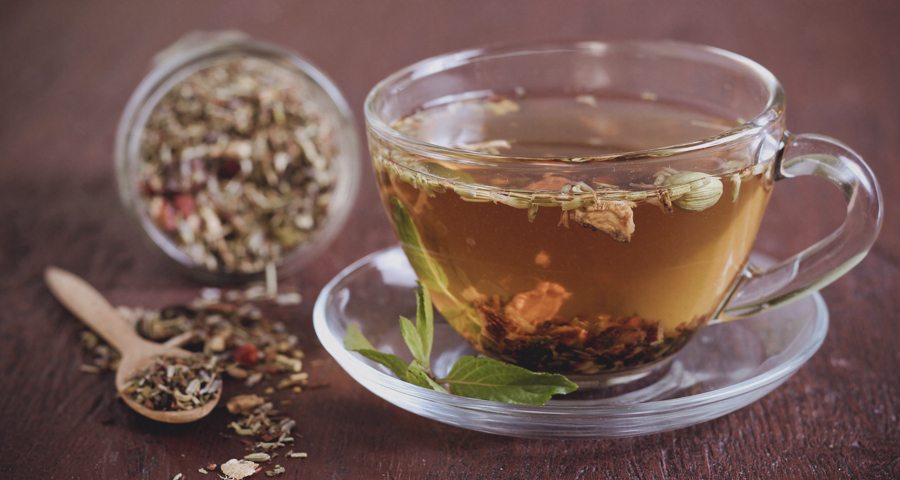Brace yourselves: the herbal cure for one of the holiday season’s most unavoidable scourges is here. Even if you’ve been maintaining a well-balanced diet for months in anticipation of stuffing your face with an amazing Thanksgiving meal, indigestion goes hand-in-hand with the decadence of the season.
The holidays, especially with Thanksgiving right around the corner, are supposed to be enjoyed with family and friends—not worrying about the aftermath of food comas. Luckily, we have plenty of indigestion remedies for you.
3 Herbal Remedies for Indigestion
1. Anise*
Latin Name:Pimpinella anisum
Anise is a soothing aromatic with properties similar to those of fennel. Teas, tincture, or oil can be used to settle the stomach and expel gas. It is useful for colic in infants and helps promote lactation for the breastfeeding mother. It is a mucolytic agent, helping to thin mucus and expel it from the lungs. It is a common ingredient in formulas for indigestion, but is not a key herb in these formulas.
Energetics: Warming and drying
Properties: Aromatic, carminative, and galactagogue
Specific Indications: King’s American Dispensatory: Flatulency, flatulent colic of infants, and to remove nausea.
Sources: Mountain Rose Herbs, San Francisco Herb Company, Starwest Botanicals, Stony Mountain Botanicals
Dosage Forms
1. Weak Infusion: 2–8 ounces 2–3 times daily. For gastrointestinal complaints in children, give 1 ounce as needed, sweetened with maple syrup. For infants, add 1 teaspoon to their bottle, or give breastfeeding mothers strong doses.
2. Tincture: Dried (1:5, 50% alcohol and 10% glycerin); 1–3 ml (0.2–0.6 tsp.) 3 times daily
3. Glycerite: Sealed simmer dried (1:8); 2–5 ml (0.4–1 tsp.) 3 times daily
*Warnings: Anise is a traditional abortifacient. There are no reports of it being harmful when used in normal food doses, but avoid medicinal doses when pregnant except under the supervision of a well-trained herbalist.
—From The Modern Herbal Dispensatory by Thomas Easley and Steven Horn
2. Rosemary
Latin name:Rosmarinus officinalis
This herb is considered a tonic for elderly people and may help improve circulation to the brain. In Germany, rosemary is approved by Commission E for use in treating indigestion, joint ailments, and stomach problems. Rosemary also has antioxidant properties that protect the brain and blood vessels.
Energetics: Warming, drying, and slightly constricting
Properties: Antidepressant, antioxidant, antirheumatic, antiseptic, carminative, cerebral tonic, and expectorant
Sources: Bulk Herb Store, Mountain Rose Herbs, San Francisco Herb Company, Stony Mountain Botanicals Dosage Forms
Weak Infusion: 1 cup up to 3 times daily
Tincture: Dried leaves (1:5, 65% alcohol, 10% glycerin); 10 drops to 3 ml (0.6 tsp.) up to 3 times daily
Glycerite: Fresh leaves (1:6, 80% glycerin sealed simmer method); dried leaves (1:6); 1–5 ml (0.2–1 tsp.) 1–3 times daily
Capsule: 500–1,500 mg up to 3 times daily
Topical Use: Prepare a salve from oil (1:4) and apply as needed. The essential oil can be applied neat, or added to salves, oils, and ointments.
Warnings: No known warnings
—From The Modern Herbal Dispensatory by Thomas Easley and Steven Horn
3. Gripe Water
Primarily to give to babies for colic, but anyone with indigestion can take this.
Ingredients
Dried herbs:
- 2 oz. anise seeds
- 2 oz. fennel seeds
- 1 oz. dill seeds
- 2½ quarts water
You will need:
- Pressure Cooker
- ¼-inch Silicone Hose (from Brewer’s Hardware)
- Possibly a Hot Plate, Depending on the Position of Your Stove
Makes and Keeps:
- Makes 1¼ cups. Keeps at least a year.
Method
- Put the seeds and water into a pressure cooker on a counter near the sink (use a hotplate if necessary). Close the lid and remove the pressure regulator to expose the vent pipe (steam exit).
- Connect the hose to the vent pipe. Pass the hose beneath the water faucet and then on and into a collecting glass bottle (10 fl. oz.).
- Turn on the heat to high. When the water boils, open the faucet to let cold water flow around and cool the hose.
- Simmer on low heat. To obtain a good-quality water, the distillation process should be slow with minimum heat; the distillate should not be warm to the touch but cool, ideally 95°F.
- Simmer until you have distilled 1¼ cups of gripe water (which in a household pressure cooker should take around 30–45 minutes).
Infants: Give 10–20 drops in water or milk up to twice daily.
Breastfeeding mothers: Take 1–1½ tsp. 3 times daily after meals.
Adults: Take 1–2 tsp. for indigestion.
—From The Herbal Handbook for Home and Health by Pip Waller
